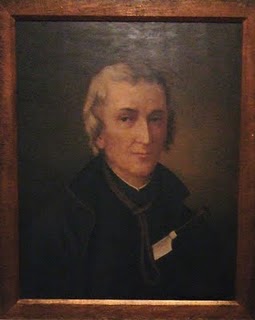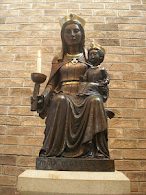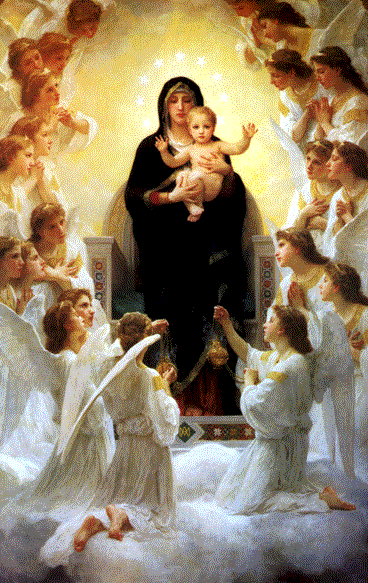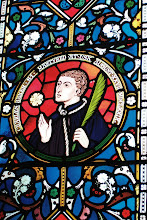In the summer of 1678, the contemptible Titus
Oates and his friend Israel Tonge hatched the fictitious Popish Plot. Near the end of September, Sir Edmund Berry
Godfrey (sometimes spelled Edmundbury Godfrey) became involved when he took the
depositions of the two plotters. On 17th
October Godfrey was found face down in a ditch on Primrose Hill. He was impaled on his own sword. Marks on his body indicated foul play. But, was it murder or was it suicide? At the time, two committees investigated
Godfrey’s death, and many theories have since been expounded, but the mystery
has never been solved. Godfrey’s
mysterious death was a boon to the anti-Catholic faction who immediately put
the blame on Catholic conspirators. As
Macaulay wrote; “The capital and the whole nation went mad with hatred and fear. The Penal Laws, which had begun to lose
something of their edge, were sharpened anew.
Everywhere, Justices were busied in searching houses and seizing
papers. All the gaols were filled with
Papists. London had the aspect of a city
in a state of siege”.
 |
| Sir Edmund Berry Godfrey |
John Arnold was born in 1634. A Justice of the Peace and Member of
Parliament, Arnold was also a zealous priest hunter and foremost in enforcing
the full weight of the Penal Laws against Catholics. In 1670, John Arnold and John Scudamore
informed the House of Lords that “at Llantarnam, an eminent papist’s house in
Monmouthshire, there is a room fitted up chapel wise for saying Mass where Fr
David Lewis, a popish priest, hath said Mass for many years past” and
that there were still six Jesuit priests at the Cwm which “had been a shelter for such
popish priests near forty years”.
In 1678 they placed new information before Parliament of “several
popish priests and the persons that do countenance them in the county of
Monmouth”. On
20th November 1668 King Charles II, under pressure from Parliament,
reluctantly issued a proclamation for the immediate arrest of all priests and
Jesuits, who were to be imprisoned “in order to their trial”.
Fr David Lewis, alias Charles Baker, was
an Abergavenny born Jesuit. He was
Superior of the Jesuit College of St Francis Xavier at the Cwm on the border of
Herefordshire and Monmouthshire. He
spent more than thirty years ministering to the harassed Catholics of the
area. As was the practice in such
dangerous times, priests often found shelter in the homes of Catholic recusants
and from such safe houses they celebrated Mass and the Sacraments and tended to
the many needs of their fellow Catholics.
It is well documented that Fr Lewis stayed in the home of Thomas Gunter
of Abergavenny and also at the home of his aunt, Lady Frances Morgan, at
Llantarnam.
For some time, Fr David Lewis had stayed
with his relatives, the Morgans, at what is now Llantarnam Abbey. When the storm of the Oates Plot broke, the
priest, not wishing to endanger the Morgans, moved into a nearby cottage at
Llantarnam. This cottage, adjoining the
blacksmith’s, was opposite the Parish Church of St Michael and All Angels.
 |
| Parish Church of St Michael and All Angels, Llantarnam |
Early on Sunday morning, 17th
November 1678, Fr Lewis was preparing to celebrate Mass when a party of six
armed dragoons burst in. They were led to
the priest by William James, a Catholic who had formerly worked for him. For this foul act of betrayal, James received
the grand sum of £220, the Government reward of £20 plus the additional £200
offered by John Arnold. It was a cruel
betrayal indeed for Fr Lewis considered John Arnold a close friend because
Arnold had always feigned friendship for the priest. Of his arrest, Fr Lewis wrote; “After
my full thirty years poor missionary labours in South Wales, on Sunday morning,
a little before day, being the 17th November 1678, I was taken by
six armed men sent by Mr John Arnold and Mr Charles Price, until then my two
very good friends and acquaintances. I
was taken in a little house in the parish of St Michael-Llantarnam in the
County of Monmouth. From thence by the
soldiers, together with such church stuff of mine they there found, carried I
was to the house of Mr Charles Price in Llanfoist”.
.jpg) |
| Plaque at the site of the arrest of St David Lewis at Llantarnam |
Three Justices of the Peace, Charles
Price, John Arnold and Thomas Lewis awaited Fr Lewis at Llanfoist. The priest was to be taken to Monmouth Gaol
and at about 2 o’clock that afternoon, he was led away from Llanfoist by Arnold
and his henchmen. Guarded by twelve
armed men, Fr Lewis was taken to his hometown, Abergavenny. The contingent entered the Golden Lion on
Frogmore Street where, in a guarded upper room, Fr David Lewis was examined by the
Recorder of Abergavenny, William Jones.
William James swore that he had seen Fr Lewis say Mass at least twenty
times. Asked if he had played any part
in the Titus Oates Plot, the priest swore on oath that he had no knowledge of
or part in any plot. Arnold, showing his
contempt for all things Catholic, sarcastically remarked that with Catholics it
was no oath to swear on the Bible.
 |
| The Site of the Golden Lion, Abergavenny |
The little group adjourned to the dining
room where they had supper together. Fr
Lewis, committed on a charge of Treason, was given the choice of spending the
night in a guarded room at the Golden Lion or of being the guest of Arnold at
his home in Llanvihangel. Arnold assured
the priest that he would be “most civilly entertained”. Fr Lewis left the decision to the others and
it was arranged that he should spend the night at Llanvihangel Court. It was a moonlit night when the party left
the Golden Lion at about 10 o’clock. It
would have been between 11 o’clock and midnight when they reached Llanvihangel
Court, a fine Elizabethan mansion that had been home to several generations of
Arnolds. The defenceless priest spent
the night in a room guarded by two “strong men”.
The next morning, Fr Lewis arose at 7 o’clock and Arnold paid him a short visit in his room where the two exchanged a few civil words. When he had finished his breakfast, Fr Lewis came downstairs to find the Magistrate and several constables loading guns in the Great Hall. Then they set out on the final leg of their journey to Monmouth Gaol.
.JPG) |
| John Arnold's Home, Llanvihangel Court |
Upon reaching Monmouth, Fr David Lewis
was incarcerated in the town’s gaol. A
friend paid 14/ a week for Fr Lewis to have a good room with a fire, candle,
bed and linen! That morning John Arnold
had assured Fr Lewis that he would not allow the gaoler to subject him to “any
incivility or severity”. It must
have been a sad shattering of all illusion regarding Arnold’s friendship for
him when the gaoler showed Fr Lewis a letter written that very day by
Arnold. The letter, dated 18th
November, ordered that a strict watch be kept on the prisoner who was guilty of
High Treason!
Fr Lewis was kept a close prisoner and
his confinement was so strict that he never left his cell. However, the Under Keeper allowed friends to
visit him during the day. For almost two
months, Fr Lewis was a prisoner in Monmouth Gaol. On 13th January 1679 he was
transferred to the new County Gaol at Usk.
Here, in the Gaol on Bridge Street, this kind and gentle Jesuit awaited
his martyrdom.








.JPG)

.JPG)





